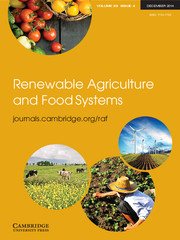Article contents
Consumer preferences for ‘natural’ agricultural practices: Assessing methods to manage bird pests
Published online by Cambridge University Press: 06 November 2015
Abstract
‘Natural’ is a popular food marketing term. Although it is not well-defined, it refers primarily to inputs used for food processing, rather than agricultural practices. Given the market success of organic and non-GMO labeled foods, other agricultural practices may have the potential to develop ‘natural’ market niches while also addressing sustainability goals. We assessed perceptions of natural for one specific set of agricultural practices, bird management methods in fruit crops, utilizing a series of four focus groups. In addition, we quantified consumer preferences for these methods with a national online survey (n = 1000). The most positively received methods, falconry and nest boxes, were typically described as more natural. Conversely, the most negatively received methods, live ammunition and methyl anthranilate spray, were frequently viewed as less natural. The majority of survey respondents indicated that controlling fruit-consuming birds with natural practices was important, but an even higher percentage deemed avoiding harms to personal health as important. Because falconry and nest boxes do not have perceived direct effects on human health, they are likely to have less market potential than more established ecolabels. Communicating the use of these practices to consumers, however, may result in consumers selecting them over other products, particularly if the associated price premiums are relatively modest.
- Type
- Research Papers
- Information
- Copyright
- Copyright © Cambridge University Press 2015
References
- 8
- Cited by



